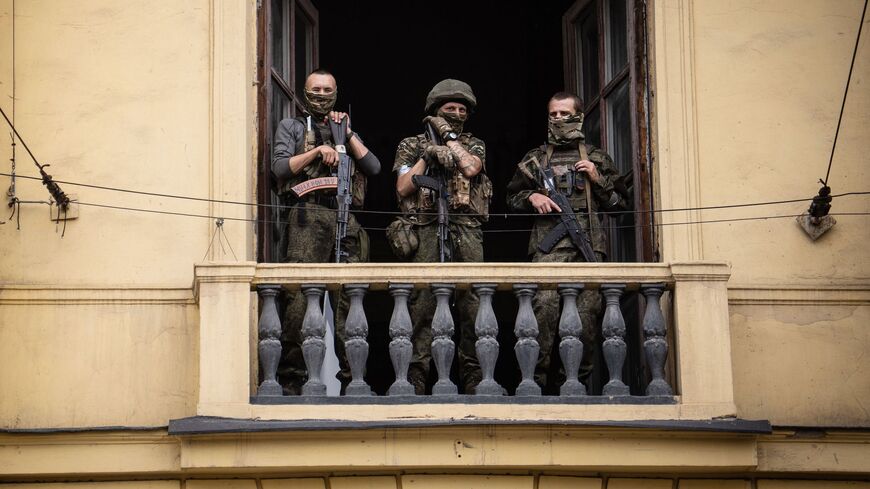The latest US sanctions on Wagner Group-affiliated companies, including one based in the UAE, could impact the shadowy Russian mercenary group’s presence and operations in Libya, according to experts.
Last weekend, the Wagner Group, lead by founder Yevgeny Prigozhin, rose in a mutiny that threatened to descend on Moscow and derail President Vladimir Putin’s leadership. In a last-minute deal brokered by Putin's close ally, Belarusian President Alexander Lukashenko, Prigozhin agreed to stop the advance on the capital and travel to Belarus. Putin said Monday that Wagner mutineers could join the Russian army or go to Belarus. Not many more details emerged of the agreement between the Wagner chief and the Kremlin, but the mutiny has drawn the shadowy mercenary group — which has been active in Ukraine as well in the Middle East and Africa — back into the spotlight.
On Wednesday, the US Treasury’s Office of Foreign Assets Control (OFAC) sanctioned four companies and one individual connected to the Wagner PMC and Prigozhin. One of the sanctioned companies was Dubai-based Industrial Resources General Trading, an industrial goods distributor. The US Treasury Department said in a statement that the company works with Diamville SAU, a sanctioned gold and diamond company controlled by Prigozhin, to allegedly ship the products from the Central African Republic to the UAE and Europe.
In January, Dubai-based aircraft company Kratol Aviation was also sanctioned by OFAC. Other UAE-based companies that are not Wagner associates have also been sanctioned due to the Russian invasion of Ukraine. In April, the United States sanctioned some UAE-based companies for allegedly shipping products to Russia.
Kimberley Donovan, director of the Economic Statecraft Initiative within the Atlantic Council's Geoeconomics Center, believes the latest Wagner-related designation will not have a direct impact on business or foreign direct sentiment in the UAE.
“UAE was greylisted by [the Financial Action Task Force] earlier this year, which signals to the global financial system that risks exist within UAE's financial sector and they need to improve their [anti-money laundering/counter-terrorist financing] regime and its implementation to comply with FATF standards. So this is not a big surprise,” Donovan told Al-Monitor.
Sanctions always have a chilling effect on business, but it is not always easy to predict the extent. Donovan said there have been issues “for years” with UAE exchanges and other types of businesses being used for terrorist financing.
“In some cases, the UAE has taken action to address the issues,” Donovan said. “They recently shut down Russian bank MTS's operations in the country. We'll see how the UAE responds to this designation.”
Time will tell whether other countries will sanction Industrial Resources General Trading, but Donovan said it probably would not make a significant difference.
“An OFAC designation carries significant weight and will restrict US persons from doing business with them and restrict IRGT's access to the USD and US financial system,” she said. “It's also a big signal that there is significant risk in working with this company. That may be enough to disrupt their activities and support to Wagner. Designations by other countries would not hurt.”
Anna Borshchevskaya, a senior fellow at the Washington Institute for Near East policy, said it's likely that more Emirati companies will be sanctioned soon due to links with Wagner. The main question is to what extent more sanctions will limit Wagner’s access to resources.
Other funding sources
The US Defense Intelligence Agency found in a 2020 assessment that the UAE may be serving as a funding source for Wagner PMC. Abu Dhabi denies the allegations. The Russian government has financed the mercenary group but over the years Wagner has found independent sources, for example in Central African Republic, by establishing control of gold and diamond mines.
“Wagner is not a pure mercenary group. It also has a business model, albeit a ruthless one. In fact there’s no equivalent to Wager (and Russian PMCs) overall in international law. It is a unique creation and as such has taken advantage of loopholes in the international legal system, simply because there is nothing like it and no precedent for it,” Borshchevskaya said.
“When it comes to the UAE, if Wagner loses funding there, it will have an impact perhaps more on Wagner activities specifically in Libya, where the UAE has reportedly funded Wagner deployment,” she added.
Andreas Krieg, a senior lecturer at the School of Security Studies at King's College, said logistics companies like Industrial Resources General Trading and Kratol Aviation are crucial for Wagner to keep its businesses running across Africa. Krieg said that Wagner’s network of overseas affiliates was built up after it started operations in Libya in 2018 “to make the expeditionary capability of Wagner in Africa and the Middle East a self-sufficient, self-funding network of companies that didn't have to rely on the Russian state anymore.”
In Libya, Egypt and UAE are backing the Libyan National Army commander, Field Marshal Khalifa Hifter, looking to topple the UN-backed government supported by Turkey and Qatar. Hifter also has warm relations with Wagner and Russia.
Anton Mardasov, a nonresident scholar at the Middle East Institute, told Al-Monitor that the UAE and Russia share common interests outside of Wagner. “Prigozhin and his PMCs are only part of the story,” he said.
“The UAE and Prigozhin have actually had no contacts for a long time, and in Libya, payment for the services of the Wagner PMC has been going through Hifter for a long time. So these proxy companies may have another jurisdiction other than the UAE,” he added.








